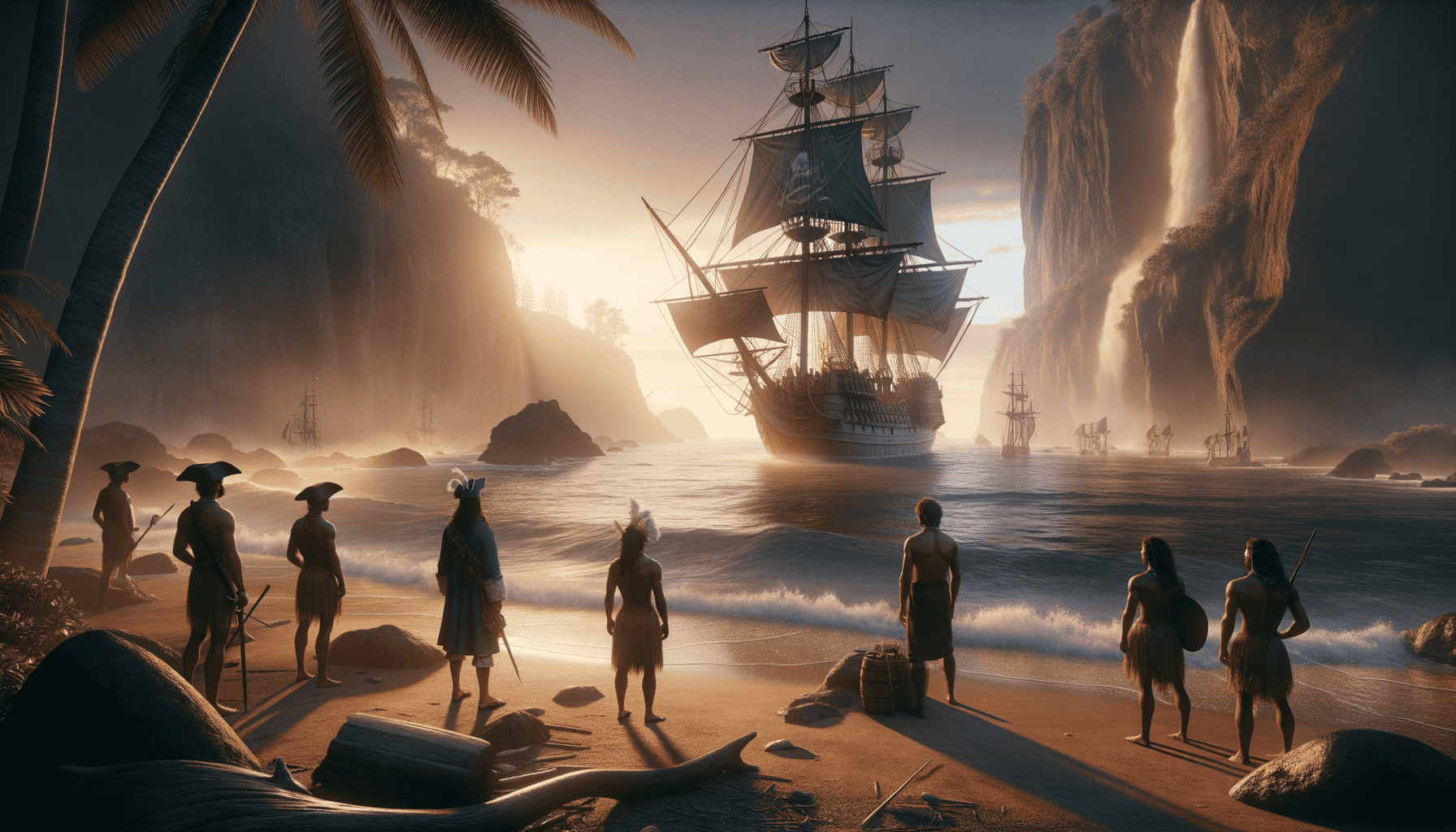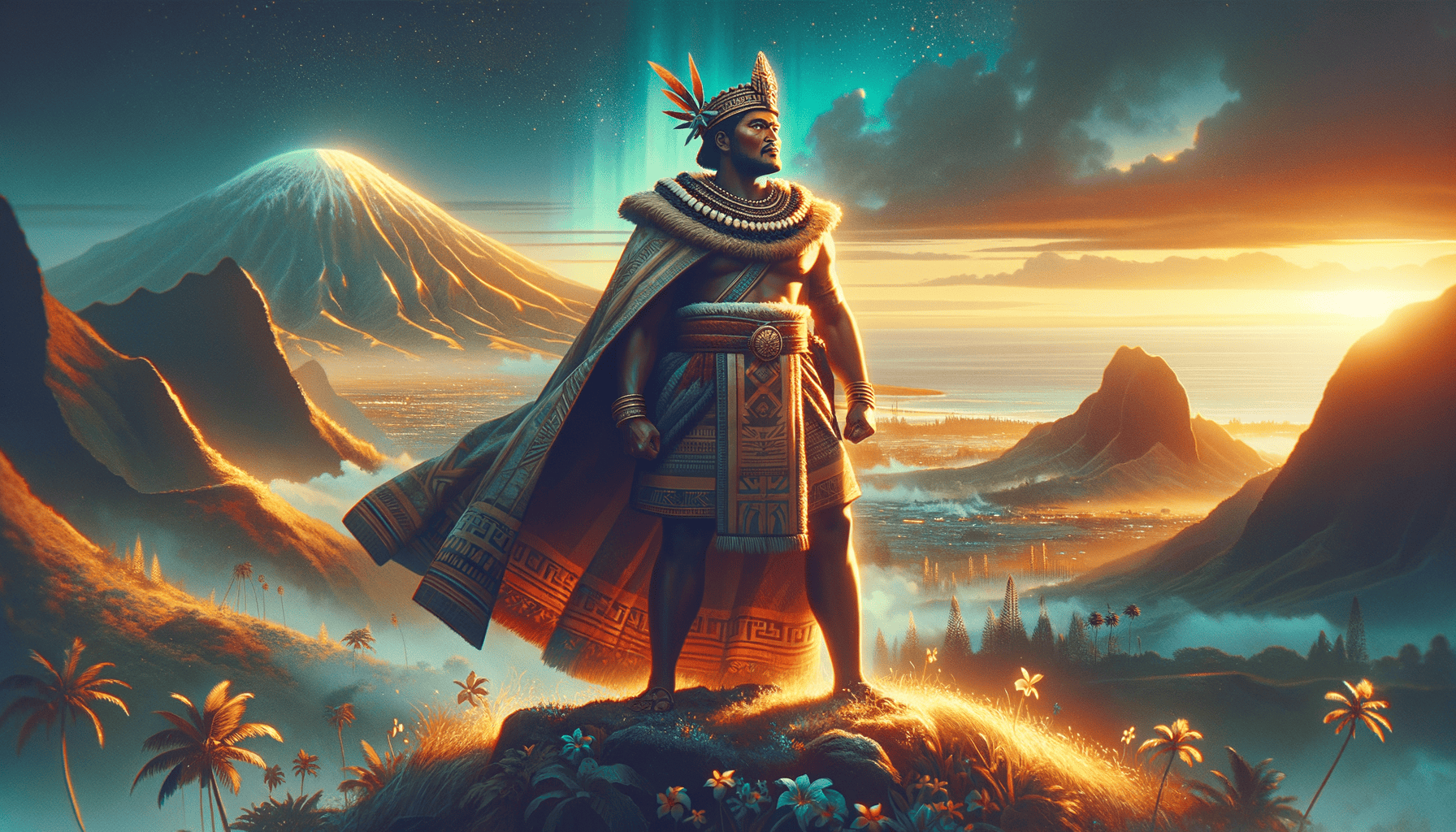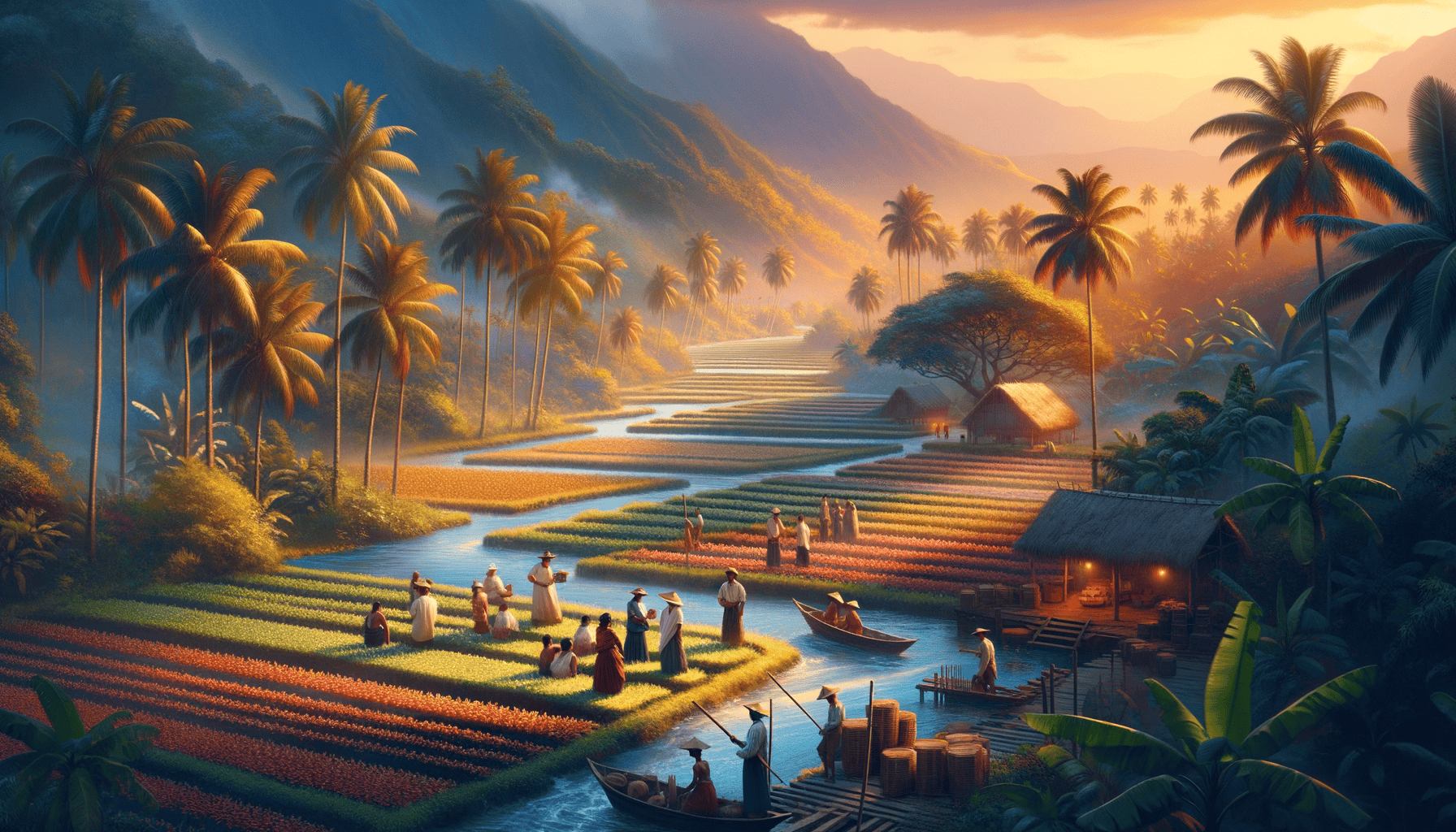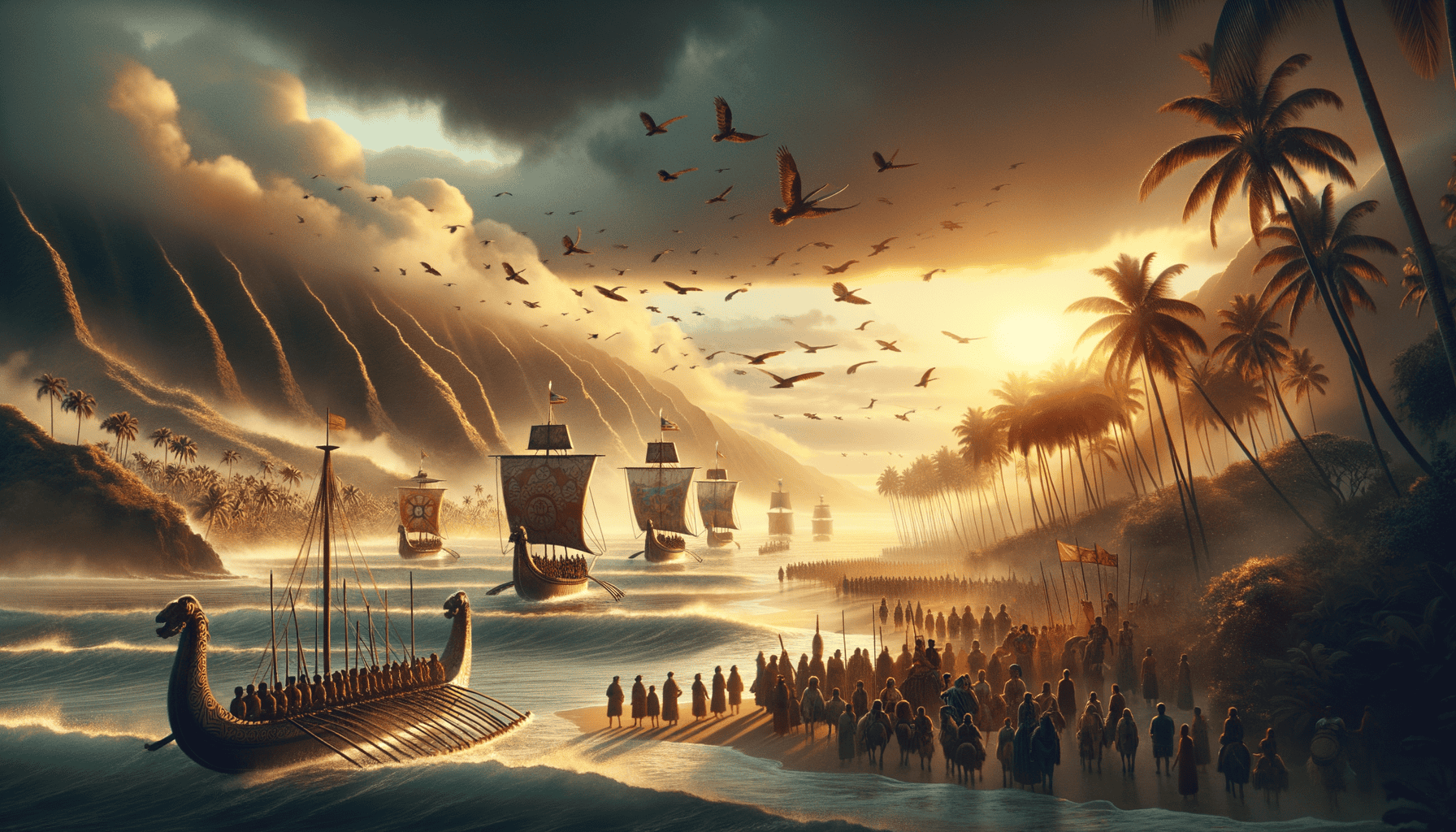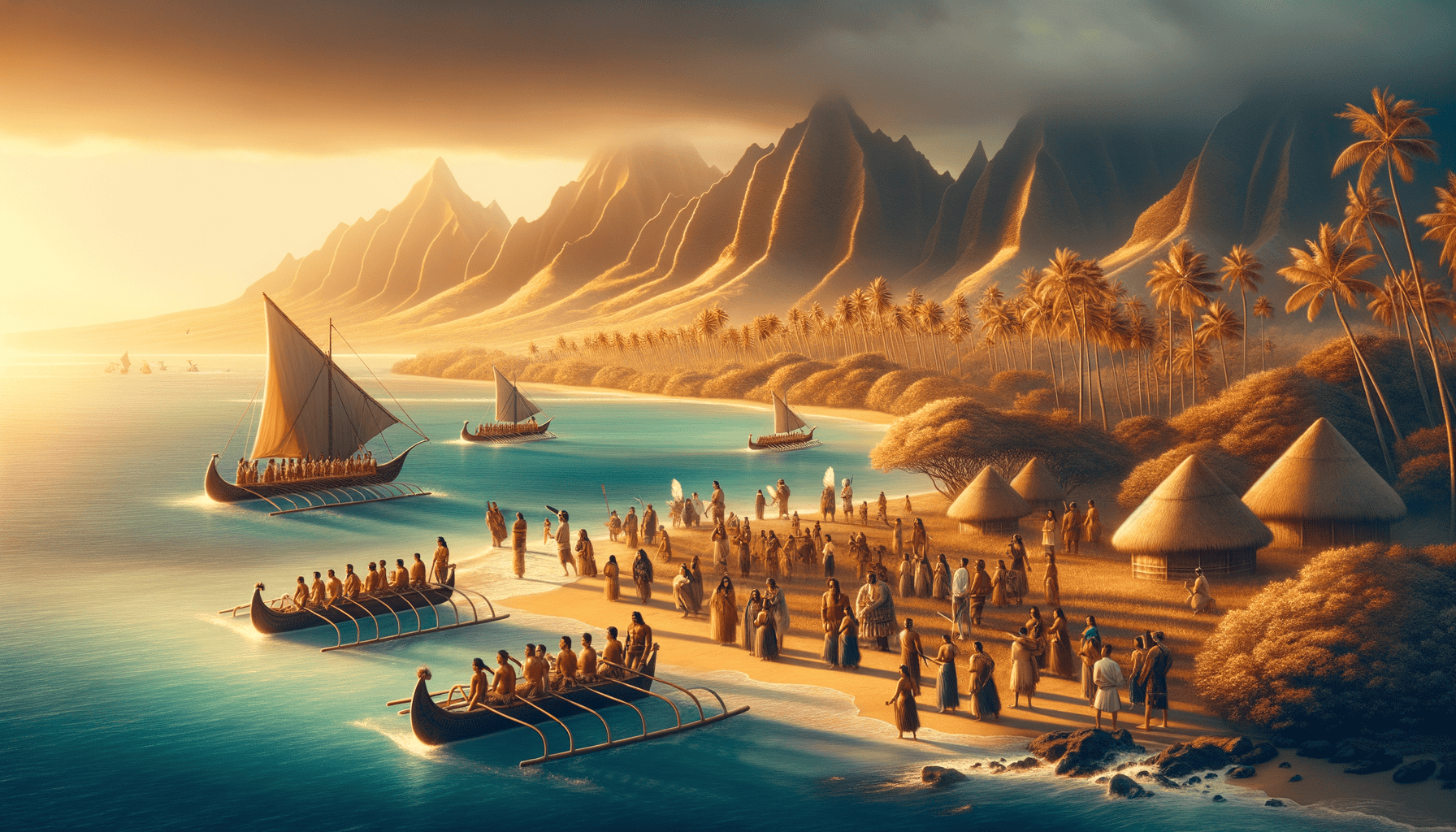Voyagers of the Pacific
Long ago, brave sailors crossed the big blue ocean in search of new homes. These sailors were called Polynesians, and they were very good at finding their way across the water. 🌊
"Look at the stars!" young Kekoa said to his father as they stood on their wooden canoe. "They show us the way, just like you taught me."
His father smiled and pointed to a bright star. "Yes, my son. Our ancestors followed these same stars to find these beautiful islands."
The Polynesians were smart sailors. They watched the stars at night and the sun during the day. They looked at:
• Birds flying over the water
• Clouds in the sky
• Waves moving in the ocean
• Fish swimming in different places
When they found the Hawaiian Islands, they knew they had found something special. The islands had tall mountains, fresh water, and lots of good soil for growing food. 🌴
"This is our new home," the leaders told their people. They named their new home Hawaii, and they worked hard to make it beautiful.
The people built homes using wood and leaves. They planted taro in the wet valleys and sweet potatoes on the dry hills. They caught fish from the ocean and shared everything with their neighbors.
“The land is our mother,” the elders would say. “We must take care of it, and it will take care of us.”
The Hawaiians made rules about how to live together. Some people became chiefs, called ali'i. Others became priests, called kahuna. Everyone had important jobs to do.
Little Leilani learned to make kapa cloth from her grandmother. "Each pattern tells a story," her grandmother said, showing her how to press designs into the soft material.
Children played in the waves and learned to surf on wooden boards. They listened to stories about gods like Pele, who lived in the volcanoes, and Maui, who pulled up the islands from the sea floor.
At night, families would gather to sing and dance hula. The dancers told stories with their hands and bodies while others played drums and sang. 🎵
"Why do we dance hula?" asked little Malia one evening.
Her uncle smiled and said, "We dance to remember our stories. We dance to keep our history alive. We dance to celebrate who we are."
The Hawaiian people built a beautiful life on their islands. They created laws, traditions, and ways of living that worked well for hundreds of years. They were happy and proud of their home.
Every morning, the sound of the conch shell would echo across the valleys. It was a reminder that a new day was beginning in paradise. 🐚
The children would wake up early to help their parents. Some would go fishing, others would work in the taro patches, and some would gather fresh fruit from the trees.
The ocean waves kept rolling onto the shore, just as they had done since the first canoes arrived. The stars kept shining at night, guiding new generations of Hawaiian children as they learned the ways of their ancestors.
The Hawaiian way of life was strong and beautiful. But soon, big changes would come to the islands. Changes that would test the strength and spirit of these brave island people.
The Arrival of Strangers
One sunny morning in 1778, something strange appeared on the horizon. Giant ships with tall white sails came close to the Hawaiian shores. 🚢
“Look!” shouted a young boy named Keoki. “The ships are bigger than anything we’ve ever seen!”
The Hawaiian people watched as pale-skinned men in strange clothes came to shore. Captain Cook and his sailors were just as surprised to see the Hawaiians.
"Welcome to our islands," said the Hawaiian chief, trying to be friendly. But neither group could understand each other's words.
The visitors brought many new things the Hawaiians had never seen before:
• Metal tools
• Glass beads
• Cloth from far away
• Strange animals like goats and pigs
At first, things seemed good. The Hawaiians traded fresh food and water for the new items. Both groups were curious about each other. 🤝
“These visitors must be from the land of our god Lono,” some Hawaiians thought. They treated Captain Cook and his men with great respect.
But soon, problems started. The sailors brought something tiny that caused big trouble – germs. Many Hawaiians got very sick because their bodies weren’t used to these new diseases. 🤒
“Why are so many people getting sick?” little Keoki asked his mother.
“The strangers brought sickness we’ve never known before,” she said sadly. “Our healing medicines don’t work against it.”
The European ships kept coming to Hawaii. They brought more new things that changed how people lived:
Iron pots replaced traditional cooking bowls. Guns replaced spears. Western clothes replaced traditional Hawaiian dress.
“Everything is changing so fast,” said an old fisherman to his grandson. “We must not forget our old ways.”
Some changes were helpful, like new tools that made work easier. But other changes hurt the Hawaiian way of life. 🌺
The visitors wanted to change how Hawaiians lived. They said their ways were better. Some Hawaiians started to forget their traditional customs.
“Remember who you are,” parents told their children. “Remember our stories, our dances, our gods.”
But more ships kept coming. More strangers arrived. The peaceful life on the islands was changing forever.
Young Keoki watched from the beach as another big ship appeared. “What will happen to our islands now?” he wondered.
The Hawaiian people were strong. They tried to keep their culture alive while dealing with all the new things. But bigger changes were coming to their beautiful islands.
As the sun set over the ocean, the sound of traditional drums mixed with new foreign music. It was a sign of how Hawaii was becoming a different place – caught between the old ways and the new. 🌅
The Rise of a Kingdom
On the big island of Hawaii, a powerful warrior named Kamehameha watched as more foreign ships arrived. He had a big dream – to bring all the Hawaiian islands together as one kingdom. 👑
“Our islands must be strong together,” Kamehameha told his followers. “Only then can we face these new changes.”
Little Maka watched as Kamehameha’s warriors trained. They now used guns along with traditional spears. Some wore western-style uniforms with Hawaiian battle capes.
“Why do we need to change how we fight?” Maka asked his father, a warrior.
“The world is changing, son. We must learn new ways while keeping our strength,” his father answered.
Kamehameha worked hard to bring the islands together:
• He built a strong army
• He made peace with other chiefs
• He learned about foreign ways
• He protected Hawaiian traditions
“The islands are like fingers on a hand,” Kamehameha would say. “Apart, they can be broken. Together, they make a strong fist.”
By 1810, something amazing happened – Kamehameha became the first king of all Hawaii! 🌺
The new kingdom was special. It mixed Hawaiian culture with new ideas:
People still honored Hawaiian gods, but also learned about the foreigners’ god. They used both old and new tools. They spoke Hawaiian but learned English too.
“Look at our flag,” a teacher told young Maka. “It has the British cross but also our own design. It shows how we’re making something new that’s still Hawaiian.” 🏁
King Kamehameha was wise. He knew Hawaii needed to change a little to survive. But he also protected important Hawaiian ways.
“Never forget who you are,” he told his people. “We are Hawaiians first, even as we learn new things.”
Ships from many countries came to Hawaii now. They wanted to trade and make friends with the new kingdom.
Maka watched the harbor fill with ships from America, Britain, and France. “We’re becoming part of the big world,” he said.
His grandmother smiled. “Yes, but we’re doing it our way, as one strong kingdom.”
When Kamehameha died in 1819, he left Hawaii stronger than ever. His son became the new king, ready to lead Hawaii into the future.
The kingdom Kamehameha built would face many challenges. But his legacy of strength and wisdom would help Hawaii navigate the changing times ahead. 🌅
As the sun set over Kamehameha’s kingdom, Maka looked at the palace where the Hawaiian flag flew proudly. “We are one people now,” he thought. “Just like the great king wanted.”
A Changing Paradise
The morning sun sparkled on the ocean as strange ships entered the harbor. They carried people dressed in black – the missionaries. 🚢
Little Kai watched from the beach with his sister Lani. “Who are they?” he asked.
“They come to teach us new ways,” his mother explained. “They bring something called Christianity.”
In the village school, Kai learned to read and write. The missionaries taught in English and Hawaiian.
“Look!” Kai showed his family the words he wrote. “Now I can write our stories down!”
"That's good," his grandfather said. "But don't forget our old ways of telling stories too."
The islands were changing fast. Big farms called plantations started growing sugar cane. They needed lots of workers.
“The land used to feed our people,” Kai’s grandmother said sadly. “Now it feeds other countries.”
New people came to work on the plantations:
• Chinese workers
• Japanese families
• Portuguese farmers
• Filipino laborers
Kai made friends with children from these families. They shared their different foods and customs. 🌈
“Why can’t we plant taro like we used to?” Lani asked one day.
“The plantation owners bought our farming land,” their father explained. “Now we must work for them to earn money.”
The missionaries changed many things. They said Hawaiian dances and some traditions were bad. 😢
“But our hula tells our history!” Lani protested when they couldn’t dance at school.
“We’ll dance at home,” her mother whispered. “We must keep our culture alive in our hearts.”
Some changes were good. Doctors brought medicine that helped sick people. New tools made some work easier.
But Kai noticed his parents looking worried. Rich plantation owners were getting more powerful than Hawaiian leaders.
“What will happen to our kingdom?” he heard grown-ups ask.
One evening, Kai’s family gathered to sing Hawaiian songs. His grandfather played the ukulele. 🎵
“No matter what changes,” his grandfather said, “remember you are Hawaiian. Our spirit is strong like the ocean.”
The sun set over the sugar cane fields. Kai watched workers heading home from the plantations. Hawaii was becoming different, but people still found ways to keep their culture strong.
“We are like the coconut palm,” his grandmother said. “We bend with the wind, but our roots stay deep in the earth.” 🌴
Dreams of a Kingdom Lost
The palace halls echoed with worried voices. Queen Liliuokalani sat at her desk, writing laws to protect her people. 👑
“Your Majesty,” a guard rushed in. “American businessmen are gathering with weapons!”
Little Malia watched from her home as soldiers marched through Honolulu. “Mama, why are there so many guns?” she asked.
“Bad things are happening, sweetheart,” her mother said softly. “The businessmen want to control our islands.” 😢
At school, Malia’s teacher told the class about changes coming:
• The Queen was being forced to give up her throne
• American businessmen were taking control
• Hawaiian language would not be taught anymore
• New laws would change how people lived
“But this is our home!” Malia’s friend Kekoa said. “They can’t just take it!”
“I will never give Hawaii away,” Queen Liliuokalani promised. “But I don’t want anyone to get hurt.”
The queen wrote a brave message to her people: “I must step down for now to prevent fighting. But I hope we can make things right later.”
“Why are you crying, Mama?” Malia asked that night.
“Because today we lost something precious,” her mother answered. “Our kingdom is gone.”
The next few years brought big changes:
Malia couldn’t speak Hawaiian at school anymore. Her grandfather couldn’t vote in elections. New people took over their neighborhood.
“Remember who you are,” Malia’s grandmother told her. “They can change our laws, but they can’t change our hearts.” ❤️
At night, families would gather to tell old stories. They sang Hawaiian songs quietly. Children learned hula dances at home.
“Will we ever get our kingdom back?” Malia asked her father.
“I don’t know, little one. But we will never stop being Hawaiian.” 🌺
Queen Liliuokalani wrote songs about love for her land. She kept hoping the United States would make things right.
But in 1898, the United States took Hawaii as its own. The American flag replaced the Hawaiian flag.
Malia grew up teaching her children about the old kingdom. “We may not have our queen,” she told them, “but we still have our pride.”
The waves still crashed on the shore. The mountains still touched the clouds. And in their hearts, the Hawaiian people kept their dreams of freedom alive. 🌈
The Spirit Lives On
The morning sun painted the mountains gold as Malia, now grown with silver in her hair, watched her granddaughter Leilani dance hula. 🌅
“Tell me again about Queen Liliuokalani, Tutu,” Leilani asked, using the Hawaiian word for grandmother.
“The queen loved her people so much,” Malia began, “that even when they took her throne, she kept fighting for Hawaii with words and songs.” 👑
Leilani practiced her hula moves as she listened. Unlike when Malia was young, now children could freely learn Hawaiian dance, language, and culture.
“Our culture is like the ocean, Leilani. The waves may go out, but they always return.”
All around them, Hawaii was changing and growing:
• Hawaiian language schools opened again
• Cultural festivals filled the streets with music
• Young people learned ancient navigation
• Native plants and animals got protection
• Communities worked to save sacred places
“Look how many people are learning hula now!” Leilani said, pointing to her friends practicing nearby.
At school, Leilani learned both English and Hawaiian. Her teacher, Kumu Kalani, taught traditional stories alongside modern subjects.
“Today we’re sailing to Kahoolawe,” Kumu Kalani announced one morning. The class would help plant native trees on the island.
“We’re healing the land,” Leilani told her grandmother that evening. “Just like we’re healing our culture.” 🌺
Malia smiled, remembering the dark days when Hawaiian ways were hidden:
“From small seeds, mighty trees grow. From quiet songs sung in shadows, our voice returns strong and clear.”
Young leaders spoke up for Hawaiian rights. Scientists used ancient wisdom to protect the ocean. Artists created new works inspired by old stories.
“What happens next, Tutu?” Leilani asked.
“That’s up to you and your generation,” Malia answered. “You carry our stories forward.” ❤️
Together, they watched the sunset paint the sky in royal purple and gold. The same colors that once flew on the Hawaiian flag still decorated the clouds.
“We are still here,” Malia whispered. “Still standing. Still Hawaiian.”
The evening wind carried the sound of drums and chanting across the valley. Somewhere, another group was practicing ancient dances, keeping the old ways alive.
Leilani took her grandmother’s hand. “I’ll remember everything you taught me, Tutu. I’ll teach my children too.”
“That’s how we keep our culture strong,” Malia said. “Like the mountains and the sea, we endure.” 🗻
As stars began to twinkle overhead, grandmother and granddaughter joined the dancers. Their movements told stories of kings and queens, of brave voyagers, of love for the land.
The spirit of Hawaii lived on in every wave, every song, every new generation learning the old ways. The journey continued, as it would for generations to come.


